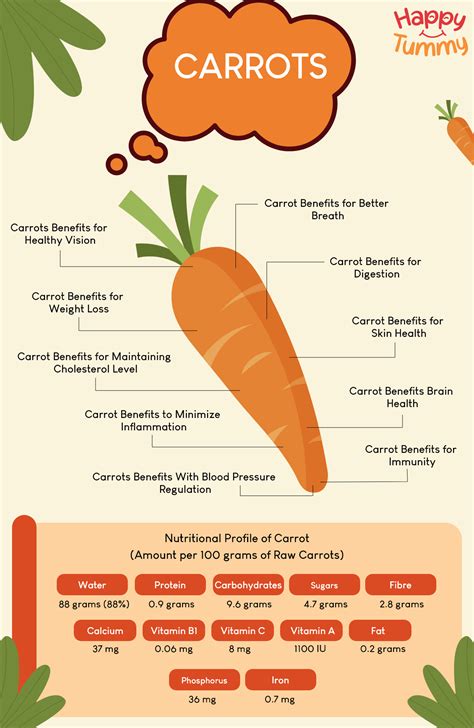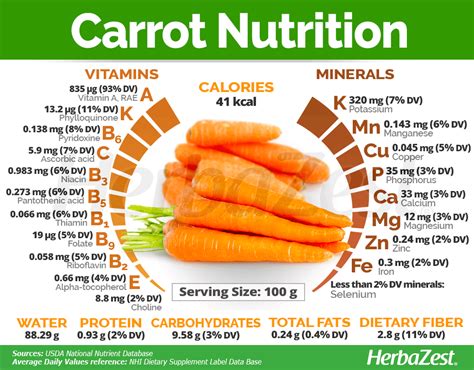Intro
Eating carrots is one of the simplest and most effective ways to improve overall health and wellbeing. These crunchy, sweet, and nutritious vegetables have been a staple in many diets for centuries, and for good reason. Carrots are packed with vitamins, minerals, and antioxidants that provide a range of benefits, from improving vision and immune function to supporting healthy digestion and reducing the risk of chronic diseases. In this article, we will explore the benefits of eating carrots and why they should be a part of your daily diet.
Carrots are one of the most widely consumed vegetables in the world, and their popularity can be attributed to their versatility, affordability, and nutritional value. They can be eaten raw or cooked, and are a great addition to a variety of dishes, from salads and stir-fries to soups and stews. Whether you enjoy them as a snack, side dish, or ingredient in your favorite recipe, carrots are a great way to boost your health and wellbeing.
The benefits of eating carrots are numerous, and research has shown that they can have a significant impact on overall health. From reducing the risk of chronic diseases to improving cognitive function and supporting healthy weight management, carrots are a nutritious and delicious addition to a healthy diet. In the following sections, we will explore the benefits of eating carrots in more detail, and provide tips and advice on how to incorporate them into your daily diet.
Introduction to Carrots

Nutritional Value of Carrots
Carrots are an excellent source of nutrients, including vitamin A, vitamin K, potassium, and fiber. They are also low in calories and rich in antioxidants, making them a great addition to a healthy diet. One medium-sized carrot contains only 25 calories, but provides 200% of the daily recommended intake of vitamin A. Carrots are also a good source of other essential nutrients, including vitamin C, calcium, and iron.Benefits of Eating Carrots

- Improved vision and eye health
- Boosted immune function
- Healthy digestion and reduced risk of chronic diseases
- Support for healthy weight management
- Improved cognitive function and reduced risk of neurodegenerative diseases
Improved Vision and Eye Health
Carrots are rich in vitamin A, which is essential for healthy vision and eye function. Vitamin A helps to protect the eyes from damage caused by free radicals, and can reduce the risk of age-related macular degeneration and cataracts. Eating carrots can also help to improve night vision, and reduce the risk of eye infections and diseases.How to Incorporate Carrots into Your Diet

- Eat carrots raw as a snack or add them to salads and slaws
- Use carrots in soups, stews, and stir-fries
- Add grated carrots to baked goods, such as muffins and cakes
- Make a carrot juice or smoothie for a healthy and refreshing drink
- Use carrots as a topping for sandwiches and wraps
Practical Tips for Eating Carrots
Here are some practical tips for eating carrots:- Choose fresh, firm carrots with no signs of damage or rot
- Store carrots in the refrigerator to keep them fresh
- Wash carrots thoroughly before eating or cooking
- Use a variety of cooking methods, such as steaming, roasting, and sautéing, to bring out the natural sweetness of carrots
- Experiment with different seasonings and spices to add flavor to carrots
Carrot Nutrition Facts

- One medium-sized carrot contains 25 calories
- Carrots are low in fat and rich in fiber
- Carrots are an excellent source of vitamin A and potassium
- Carrots contain a range of antioxidants, including beta-carotene and lutein
- Carrots are low in sodium and rich in minerals, such as calcium and iron
Carrot Allergy and Intolerance
While carrots are generally considered safe to eat, some people may experience an allergy or intolerance to carrots. Symptoms of a carrot allergy or intolerance can include:- Hives or itchy skin
- Swelling of the face, lips, or tongue
- Stomach cramps or diarrhea
- Vomiting or nausea
Carrot Recipes

- Carrot and ginger soup
- Roasted carrots with herbs and spices
- Carrot and avocado salad
- Carrot and apple juice
- Carrot cake with cream cheese frosting
Carrot Fun Facts
Here are some fun and interesting facts about carrots:- Carrots were originally purple, not orange
- Carrots are a member of the parsley family
- Carrots are a cool-season crop, which means they thrive in temperate climates
- Carrots are low in calories and rich in fiber
- Carrots are an excellent source of vitamin A and potassium
What are the health benefits of eating carrots?
+Eating carrots can have a range of health benefits, including improved vision and eye health, boosted immune function, and healthy digestion and reduced risk of chronic diseases.
How many carrots should I eat per day?
+The recommended daily intake of carrots varies, but eating 1-2 medium-sized carrots per day can provide a range of health benefits.
Can I eat carrots if I have a carrot allergy or intolerance?
+No, if you have a carrot allergy or intolerance, it is best to avoid eating carrots altogether. Instead, try alternative vegetables, such as sweet potatoes or parsnips.
In conclusion, eating carrots is a simple and effective way to improve overall health and wellbeing. With their rich nutritional value, delicious flavor, and versatility in cooking, carrots are a great addition to a healthy diet. Whether you enjoy them raw or cooked, carrots are a nutritious and delicious way to boost your health and wellbeing. So next time you're at the grocery store or farmer's market, be sure to pick up a bunch of carrots and start experiencing the benefits for yourself!
